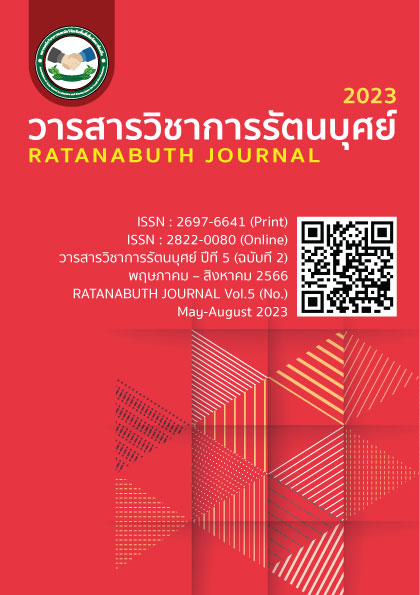Leadership Style of School Administrators Effective to Hing Performance Organization of Schools Under Loei Primary Educational Service Area Office 1 Leadership Style of School Administrators Effective to Hing Performance Organization of Schools Under Loei Primary Educational Service Area Office 1
Main Article Content
Abstract
Schools, as educational organizations, need to develop into high-performance organizations. Because the world in the 21st century is a dynamic world with rapid changes. Managers must use several leadership styles for each situation. in order to be able to perform missions to achieve the objectives effectively.
The purposes of this research were to study 1) study compliance level of leadership style of school administrators in the schools under Loei primary educational service area office 1, 2) study the level of the professional learning community in the schools in the schools under Loei primary educational service area office 1, 3) study the relationship between the leadership style of school administrators and the professional learning community in the schools in the schools under Loei primary educational service area office 1, 4) Leadership style of school administrators effective to high performance organization of schools under loei primary educational service area office 1, and 5) create a predicative equation of the Leadership style of school administrators effective to high performance organization of schools under loei primary educational service area office 1. The sample was a group of 299 School Administrators’ and teachers in the schools under Loei primary educational service area office 1 in the academic year 2022. The research tool was a questionnaire. Statistics used to analyze data by frequency, percentage, average, standard deviation, Pearson’s product moment correlation coefficient analysis, and stepwise multiple regression analysis.
The results of the study revealed as follows: 1) Leadership style of school administrators in the schools under Loei primary educational service area office 1, both overall and individual aspects, were at the high level, 2) The high performance organization of schools under Loei primary educational service area office 1, both overall and individual aspects, was at the high level, 3) The leadership style of school administrators and high performance organization of schools under loei primary educational service area office 1 had a positive relationship with a high level at the .01 level of significance. 4) leadership style of school administrators as achievement - oriented leadership, supportive leadership and participative leadership, consideration could predict the high performance organization of schools under loei primary educational service area office 1 at the .01 5) achievement - oriented leadership, supportive leadership and participative leadership effective to high performance organization of schools under loei primary educational service area office 1. It could concurrently predict at 58.20%. The predictive equation could be written in form of standard scores as follow: = 0.273(x3) + 0.269(x4) + 0.225(x1)
Article Details

This work is licensed under a Creative Commons Attribution-NonCommercial-NoDerivatives 4.0 International License.
References
กระทรวงศึกษาธิการ. (2562). การเรียนรู้ในศตวรรษที่ 21, สืบค้นเมื่อ 10 พฤศจิกายน 2565, จาก http://www.moe.go.th/moe/th/news/detail/php?News.
จักรี แก้วน้ำคำ. (2561). โมเดลสมการโครงสร้างภาวะผู้นำแบบประสานพลังที่ส่งผลต่อการเป็นองค์การสมรรถนะสูงของโรงเรียนสังกัดสำนักงานเขตพื้นที่การศึกษามัธยมศึกษา เขต 21.
บัณฑิตา สิทธิพงศากุล. (2564). ภาวะผู้นำของผู้บริหารกับองค์กรสมรรถนะสูงของสถานศึกษาสังกัดสำนักงานเขตพื้นที่การศึกษาประถมศึกษาสมุทรสงคราม. วิทยานิพนธ์. หลักสูตรศึกษาศาสตรมหาบัณฑิต. สาขาวิชาการบริหารการศึกษา, บัณฑิตวิทยาลัย, มหาวิทยาลัยศิลปากร.
บุสตามัน กามะ. (2564). ภาวะผู้นำตามทฤษฎีวิถีทาง-เป้าหมายของผู้บริหารสถานศึกษากับแรงจูงใจในการปฏิบัติงานของครูสังกัดอาชีวศึกษาสามจังหวัดชายแดนภาคใต้. วิทยานิพนธ์. หลักสูตรครุศาสตรมหาบัณฑิต, สาขาวิชาการบริหารการศึกษา, บัณฑิตวิทยาลัย, มหาวิทยาลัยราชภัฏยะลา.
ปารณีย์ ณ นคร. (2564). แบบภาวะผู้นำที่ส่งผลต่อการบริหารงานตามมาตรฐานของศูนย์พัฒนาเด็กเล็กสังกัดองค์กรปกครองส่วนท้องถิ่นในจังหวัดฉะเชิงเทรา. วิทยานิพนธ์. หลักสูตรครุศาสตรมหาบัณฑิต, สาขาวิชาการบริหารการศึกษา, มหาวิทยาลัยราชภัฏราชนครินทร์.
เพ็ญศิริ ฤทธิกรณ์. (2559). ทักษะการบริหารของผู้บริหารที่ส่งผลต่อความเป็นองค์กรสมรรถนะสูงของโรงเรียน สังกัดสำนักงานเขตพื้นที่การศึกษาประถมศึกษาพระนครศรีอยุธยา เขต 2. วิทยานิพนธ์. หลักสูตรปริญญาศึกษาศาสตรมหาบัณฑิต. สาขาวิชาการบริหารการศึกษา, บัณฑิตวิทยาลัย, มหาวิทยาลัยศิลปากร.
ไพฑูรย์ สินลารัตน์ และคณะ. (2560). การศึกษา 4.0 เป็นยิ่งกว่าการศึกษา. พิมพ์ครั้งที่ 4. กรุงเทพฯ:โรงพิมพ์แห่งจุฬาลงกรณ์มหาวิทยาลัย.
ภัทราพร เกษสังข์. (2549). การวิจัยทางการศึกษา. คณะครุศาสตร์. เลย : มหาวิทยาลัยราชภัฏเลย.
สุชาติ ทองมา. (2560). รูปแบบภาวะผู้นำที่ส่งผลต่อประสิทธิผลการบริหารงานวิชาการของผู้บริหารสถานศึกษา สังกัดสำนักงานคณะกรรมการการศึกษาขั้นพื้นฐาน. วิทยานิพนธ์ปริญญาครุศาสตรดุษฎีบัณฑิต, สาขาวิชาการบริหารการศึกษา, มหาวิทยาลัยราชภัฏพระนครศรีอยุธยา.
สุภาพร โสภิณ. (2563). ภาวะผู้นำเชิงสร้างสรรค์ของผู้บริหารสถานศึกษาที่ส่งผลต่อการเป็นองค์กรสมรรถนะสูงของโรงเรียน สังกัดสำนักงานเขตพื้นที่การศึกษามัธยมศึกษา เขต 21. วิทยานิพนธ์. ปริญญาศึกษาศาสตรมหาบัณฑิต, มหาวิทยาลัยขอนแก่น.
สมพงษ์ เชือกพรม. (2564). ภาวะผู้นำเชิงนวัตกรรมที่ส่งผลต่อการเป็นองค์การสมรรถนะสูงของโรงเรียน สังกัดสำนักการศึกษาเมืองพัทยา จังหวัดชลบุรี. วิทยานิพนธ์. หลักสูตรครุศาสตรมหาบัณฑิต, สาขาวิชาการบริหารการศึกษา, มหาวิทยาลัยราชภัฏราชนครินทร์.
เสริมศักดิ์ วิศาลาภรณ์. (2552). ภาวะผู้นำ. ประมวลสาระชุดวิชาทฤษฎีและแนวปฏิบัติในการบริหาร
สำนักงานคณะกรรมการพัฒนาระบบราชการ. (2563). การจัดทำคู่มือการปฏิบัติงาน Work Manual.สืบค้นเมื่อวันที่ 5 ธันวาคม 2563, จาก https://www.opdc.go.th/content/Nzc.
สุดารัตน์ นารอยี. (2564). ภาวะผู้นำตามวิถีทางและเป้าหมายของผู้บริหารสตรี สังกัดสำนักงานเขตพื้นที่การศึกษาประถมศึกษาสตูล. การประชุมหาดใหญ่วิชาการระดับชาติและนานาชาติ 12, 958-975.
Al Khajeh, Ebrahim Hasan. (2018). Impact of Leadership Styles on Organizational Performance. Journal of Human Resources Management Research, Vol. 2018, abstract.
Bass, B.M. and Avolio, B.J. (1990). The four Is Transformational Leadership. JournalOf European Industrial Training, 15 (2).
Cronbach, L.J. (1990). Essentials of psychological testing. (5th ed.). New York: Harper & Row.
Buytendijk, F. (2006). The five keys to building a high performance organization. Business Performance Management Magazine, 4(1), 24-47.
David, J.C. (1998). Organizational Behavior: The Management of Individual and Organization Performance. 2nd ed. USA: Allyn and Bacon: Prentice-Hall.
Krejcie, R.V., & D.W. Morgan. (1970). “Determining Sample Size for Research Activities”. Educational and Psychological Measurement. 30(3) : 607 – 610.
Lipham, James M. & Hoch, James A. (1974). The Principalship: Foundations and Functions. New York: Harper & Row Publisher.
Likert, R.. (1967). The Method of Constructing and Attitude Scale. In Reading in Fishbeic, M (Ed.), Attitude Theory and Measurement (pp. 90-95). NewYork: Wiley & Son.
Waal, A. A. D. (2007). (2010). The Characteristics of a High PerformanceOrganization. Retrieved July 31, 2022, from http://www.hpocenter.com.


